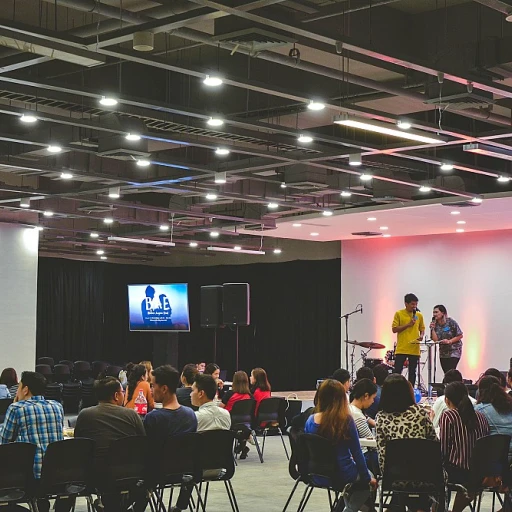
Understanding organizational awareness in the HR context
The Foundation of Organizational Awareness in HR
Organizational awareness is a crucial element in human resources, shaping how people understand the culture, power relationships, and social dynamics within a company. This ability to read the organizational landscape goes beyond knowing the formal structure. It involves understanding the unwritten rules, the emotional climate, and the political and social currents that influence how work gets done. For HR professionals, developing organizational awareness means being attuned to the subtle cues that drive change, leadership, and team effectiveness.
Why Organizational Awareness Matters
Awareness in the workplace is not just about individual emotional intelligence. It’s about recognizing how the collective culture, leadership styles, and informal networks impact the organization’s success. Leaders with strong organizational awareness can identify opportunities for growth, anticipate challenges, and foster a culture where people feel empowered to share ideas and collaborate. This awareness is also vital for leadership development, as it helps leaders navigate complex social environments and build trust across teams.
- Emotional and social awareness: Understanding the emotional undercurrents and social relationships within teams
- Organizational culture: Recognizing the values, beliefs, and behaviors that define how work happens
- Power relationships: Identifying who influences decisions and how informal networks operate
- Ability to read change: Sensing shifts in the company’s direction, morale, or priorities
Building Organizational Awareness in HR
Developing organizational awareness is an ongoing process. It requires HR professionals to actively listen, observe, and engage with people at all levels. This includes understanding the emotional drivers behind decisions, the impact of leadership on culture, and the ways in which organizational change is communicated and received. By building organizational awareness, HR can support leaders in making informed decisions, drive positive change, and strengthen the overall culture of the organization.
For those looking to deepen their understanding of these concepts and their relevance in the context of artificial intelligence, this awareness primer on DEI terms in AI for HR offers free access to foundational knowledge.
The role of artificial intelligence in enhancing organizational awareness
AI’s Impact on Organizational Awareness
Artificial intelligence is transforming how organizations understand themselves and their people. By analyzing vast amounts of data, AI tools can reveal patterns in organizational culture, leadership dynamics, and social interactions that were previously hard to see. This deeper awareness helps leaders and HR professionals make informed decisions about change, team building, and leadership development.
From Data to Emotional and Social Insights
AI systems can process feedback, surveys, and communication data to measure the emotional climate of a company. This supports the development of organizational awareness by identifying strengths and areas for improvement in emotional intelligence, social awareness, and power relationships. The ability to read and interpret these signals is essential for building organizational resilience and a healthy culture.
- Emotional intelligence: AI can highlight trends in employee sentiment, supporting emotional control and understanding within teams.
- Social awareness: By mapping networks and interactions, AI helps leaders see how information and influence flow through the organization.
- Organizational culture: AI-driven insights reveal how values and behaviors are shared, supporting efforts to develop organizational culture and drive positive change.
Supporting Leadership and Change
With AI, leaders gain a clearer picture of the company’s social and political landscape. This awareness organizational is crucial for effective leadership development and for navigating complex change initiatives. AI tools can also help identify emerging leaders and support best practices in leadership by providing a real-time awareness primer on team dynamics and engagement.
For a deeper understanding of how AI intersects with diversity, equity, and inclusion in HR, you can explore this guide to DEI terms in artificial intelligence for human resources.
Unlocking the Power of Organizational Awareness
AI’s ability to analyze and share insights empowers organizations to develop organizational awareness at scale. This supports not only the company’s strategic goals but also the well-being of its people. As organizations continue to adopt AI, the focus on emotional, social, and cultural intelligence will become even more important for building a thriving workplace.
Practical applications of AI for HR professionals
AI-powered tools for reading organizational dynamics
Artificial intelligence is reshaping how HR professionals develop organizational awareness and navigate the complex web of relationships within a company. By leveraging AI, HR teams gain the ability to read and interpret the subtle signals that shape organizational culture, power relationships, and team dynamics. This awareness is crucial for leaders and people managers aiming to foster a healthy work environment and drive positive change.
- Sentiment analysis: AI can analyze employee feedback, surveys, and communication channels to gauge the emotional climate and social awareness within teams. This helps HR identify areas where emotional intelligence and emotional control need strengthening.
- Network analysis: AI-driven mapping of organizational networks reveals informal leaders, key influencers, and political social structures. Understanding these connections supports leadership development and helps in building organizational resilience.
- Culture diagnostics: AI tools assess alignment between stated organizational values and actual behaviors, offering a clear awareness primer for developing organizational culture and supporting leadership initiatives.
Supporting leadership and team development
AI enhances the ability of HR professionals to support leaders in developing organizational awareness and emotional intelligence. By providing data-driven insights, AI empowers leaders to make informed decisions, adapt to change, and nurture a culture of trust and collaboration. For example, AI can highlight gaps in leadership development or identify teams that may benefit from targeted interventions to improve social awareness and communication.
Optimizing job structures and career paths
One of the most impactful applications of AI in HR is in job leveling and career pathing. AI can analyze job descriptions, performance data, and market trends to ensure fair and transparent job structures. This not only supports organizational awareness but also helps people understand their growth opportunities within the company. For a deeper look at how AI is transforming these processes, read this detailed guide on AI-powered job leveling.
Facilitating change and knowledge sharing
AI-driven platforms enable free access to organizational knowledge, making it easier for employees to share insights and best practices. This fosters a culture of continuous learning and supports the development of organizational awareness across all levels. By surfacing relevant information and connecting people with similar interests or challenges, AI strengthens the collective intelligence of the organization.
| AI Application | Organizational Benefit |
|---|---|
| Sentiment Analysis | Improves emotional climate and awareness emotional across teams |
| Network Analysis | Reveals power relationships and supports leadership development |
| Culture Diagnostics | Aligns organizational culture with company values |
| Job Leveling | Ensures fair career progression and organizational clarity |
| Knowledge Sharing Platforms | Facilitates change and builds organizational awareness |
Challenges and limitations of AI-driven organizational awareness
Complexities in Data Interpretation and Context
AI systems in HR rely on vast amounts of organizational data to identify patterns and trends. However, interpreting the nuances of organizational culture, emotional intelligence, and social awareness remains a significant challenge. AI may struggle to fully grasp the subtle power relationships and informal networks that shape a company's culture. This can lead to incomplete or misleading insights, especially when the technology lacks the ability to read between the lines or understand the emotional context behind people’s actions.
Bias and Fairness Concerns
AI-driven tools are only as unbiased as the data and algorithms behind them. If historical data reflects existing inequalities or cultural blind spots, AI can inadvertently reinforce these issues. For example, an AI system might overlook the importance of emotional control or social awareness in leadership development if such qualities were not previously valued or measured within the organization. This can affect the ability to develop organizational awareness and hinder efforts to build a more inclusive organizational culture.
Transparency and Explainability
Many AI models operate as “black boxes,” making it difficult for HR professionals and leaders to understand how decisions are made. This lack of transparency can erode trust among employees and leadership, especially when AI recommendations impact sensitive areas like team dynamics, leadership selection, or organizational change. People want to know how and why decisions are made, particularly when it comes to developing organizational awareness and fostering a healthy company culture.
Integration with Human Judgment
While AI can process large volumes of data quickly, it cannot replace the nuanced judgment of experienced HR professionals. The ability to read social cues, understand emotional undercurrents, and navigate political social dynamics is still best handled by humans. Overreliance on AI risks diminishing the value of human insight, which is essential for building organizational awareness and supporting leadership development.
Data Privacy and Security
Collecting and analyzing employee data to enhance organizational awareness raises important privacy and security concerns. Organizations must ensure that sensitive information is protected and that employees have free access to understand how their data is being used. Balancing the power of AI with respect for individual privacy is crucial for maintaining trust and supporting a positive organizational culture.
- AI may miss subtle emotional or social signals critical for organizational awareness
- Bias in data can perpetuate existing power relationships and hinder change
- Lack of transparency can undermine leadership and employee trust
- Human judgment remains vital for interpreting complex organizational dynamics
- Protecting employee data is essential for ethical AI use in HR
Ethical considerations for AI in HR
Balancing Technology with Human Values
Integrating artificial intelligence into human resources brings a new level of organizational awareness, but it also raises important ethical questions. As organizations leverage AI to better understand people, culture, and power relationships, it is crucial to ensure that technology supports—not replaces—the human element at work. The ability to read and interpret emotional and social cues, often described as emotional intelligence, remains essential for leadership and team dynamics.
Key Ethical Concerns in AI-Driven HR
- Bias and Fairness: AI systems can unintentionally reinforce existing biases within an organization. If not carefully monitored, algorithms may disadvantage certain groups, impacting diversity and inclusion efforts. Developing organizational awareness means regularly auditing AI tools for fairness and transparency.
- Privacy and Data Security: Collecting and analyzing employee data to enhance organizational culture and awareness raises privacy concerns. Organizations must establish clear guidelines for data use, ensuring free access to information does not compromise individual rights.
- Transparency and Accountability: Employees and leaders should understand how AI-driven decisions are made. Providing an awareness primer and clear communication about AI processes helps build trust and supports leadership development.
- Emotional and Social Impact: While AI can support awareness organizational efforts, it cannot fully replace the emotional control and social awareness required for effective leadership. Maintaining a balance between technology and human judgment is vital for sustaining a healthy organizational culture.
Building Ethical Foundations for AI in HR
Organizations aiming to develop organizational awareness with AI should prioritize ethical best practices. This includes ongoing training for HR professionals, fostering a culture of openness, and involving diverse teams in AI implementation. By focusing on the ability to read political social dynamics and understanding the power of organizational awareness, companies can harness AI’s potential while respecting the values that define their workplace.
Best practices for integrating AI into HR strategies
Building a Foundation for Responsible AI Adoption
Integrating artificial intelligence into human resources requires more than just technical implementation. It demands a thoughtful approach that considers the unique culture, leadership style, and social dynamics of each organization. Developing organizational awareness is essential for leaders and teams to understand how AI can support—not replace—the human elements of HR. The ability to read the emotional and political social landscape within a company helps ensure that AI tools align with organizational values and goals.
Key Steps for Effective Integration
- Start with an awareness primer: Educate HR professionals and leaders about the basics of AI, its potential, and its limitations. This helps build a shared understanding and reduces resistance to change.
- Assess organizational culture: Evaluate how your company’s culture and leadership approach may influence the adoption of AI. Emotional intelligence and social awareness are critical for anticipating how people will react to new technologies.
- Involve stakeholders early: Engage employees, managers, and leaders in conversations about AI integration. Encourage them to share their perspectives and concerns, fostering a sense of ownership and trust.
- Prioritize transparency: Clearly communicate how AI will be used, what data will be collected, and how decisions will be made. Transparency supports emotional control and helps build confidence in AI-driven processes.
- Focus on leadership development: Equip leaders with the skills to manage change, navigate power relationships, and support teams through transitions. Leadership plays a central role in developing organizational awareness and guiding successful AI adoption.
- Monitor and adapt: Continuously evaluate the impact of AI on organizational awareness, culture, and team dynamics. Be prepared to adjust strategies as needed to ensure alignment with company values and goals.
Fostering a Culture of Continuous Learning
AI in HR is not a one-time project but an ongoing journey. Encourage teams to read, learn, and share insights about AI, emotional intelligence, and organizational awareness. Free access to training resources and regular discussions can help people develop the ability to read complex social and emotional cues, strengthening the organization’s overall awareness. By prioritizing best practices and a human-centric approach, companies can harness the power of AI to build stronger, more resilient teams and cultures.













